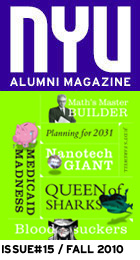
“There really is a paradigm that says ‘the Middle East is just reactive and defensive and everything you see there is just a reaction to the way the United States acts, or to colonialism, or Zionism or imperialism.’… Frankly, it’s not so interesting to look at the Middle East as a place that just reacts to the United States. You might as well just study the United States then.”
—The Weekly Standard Middle East correspondent Lee Smith at the Middle East and United States Strategy series, hosted by the Robert F. Wagner Graduate School of Public Service“I get this one a lot: ‘Oh, my God, you’re a lot bigger than you look on TV.’ And I’m always like, ‘Well, yeah. I mean how big is your television, lady?’ ”
—Ben Bailey, Emmy-winning host of Cash Cab, taping a stand-up special for Comedy Central at the Skirball Center for the Performing Arts“My mom said, ‘You gotta try this Internet thing out. It’s like a giant library.’ [Then] I got there and the human element was so incredibly powerful and striking-literally the first time I logged on I was chatting with somebody in Alabama.”
—Clay Shirky, adjunct professor at the Interactive Telecommunications Program and author of Cognitive Surplus, discusses what sparked his interest in the Internet during the Arthur L. Carter Journalism Institute’s Primary Sources series“In 1965, there were 160,000 people in jails and prisons in America. Today, there are 2.3 million. There are nearly 6 million under probation or parole.… [Mass incarceration] has created a culture of despair and hopelessness that actually feeds violence and criminality.”
—Professor Bryan Stevenson, director of the Equal Justice Initiative, at the forum “Does the United States Incarcerate Too Many People?” hosted by the School of Law






